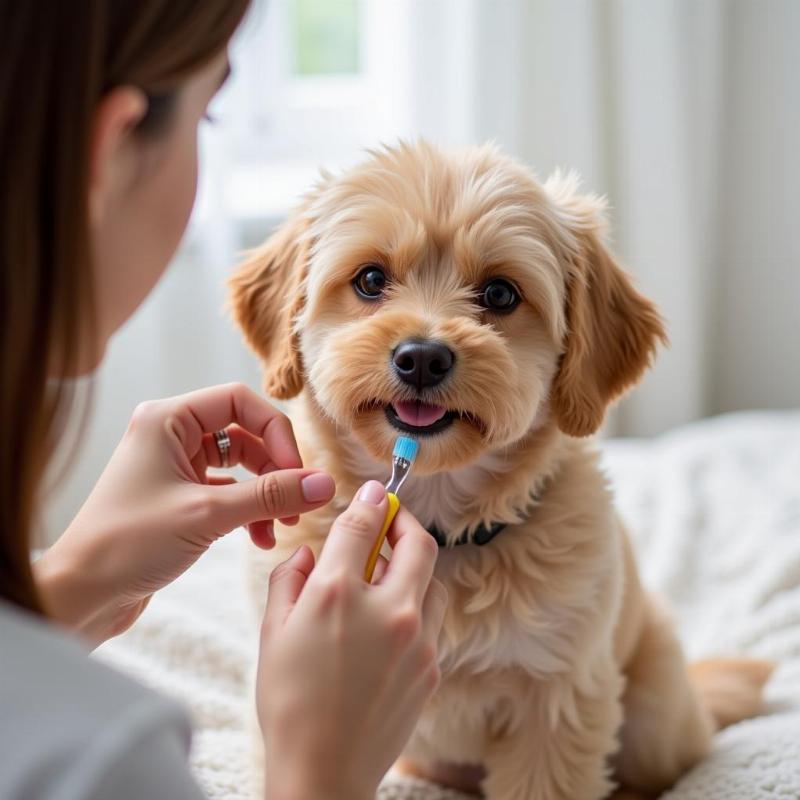Maintaining your dog’s oral hygiene is a crucial aspect of their overall health. Just like humans, dogs can develop plaque and tartar buildup, leading to gum disease, tooth decay, and even more serious health issues. So, how often should you clean your dog’s teeth? The ideal frequency is daily, just like with your own teeth. However, we understand that this isn’t always feasible. Aiming for at least a few times a week is a great start, and even brushing once a week can make a significant difference in preventing dental problems.
 Dog Getting Teeth Brushed
Dog Getting Teeth Brushed
Understanding the Importance of Regular Dog Teeth Cleaning
Why is regular teeth cleaning so vital for your furry friend? Uncleaned teeth accumulate plaque, a sticky film containing bacteria. Over time, this plaque hardens into tartar, which can irritate the gums and lead to gingivitis. If left untreated, gingivitis can progress to periodontal disease, a severe infection that can damage the supporting structures of the teeth, causing tooth loss and even impacting other organs like the heart, liver, and kidneys.
Regular brushing helps to remove plaque before it hardens into tartar, preventing these dental problems and keeping your dog’s breath fresh. In the US, periodontal disease is one of the most common health problems in dogs, especially as they age. Preventative care, like regular brushing, is key to avoiding costly veterinary treatments and ensuring your dog’s long-term health and well-being.
How to Clean Your Dog’s Teeth
Introducing teeth cleaning to your dog should be a gradual and positive experience. Start by getting your dog used to having their mouth touched. Gently lift their lips and massage their gums. Once they are comfortable with this, introduce a dog-specific toothbrush and toothpaste. Never use human toothpaste, as it contains ingredients like xylitol that are toxic to dogs. There are many flavored dog toothpastes available that make the experience more enjoyable for your furry companion.
Begin by brushing a few teeth at a time, gradually increasing the duration and area covered. Be patient and gentle, and always reward your dog with praise and treats after each session. You can also consider using dental chews, treats, and toys approved by the Veterinary Oral Health Council (VOHC) as supplementary cleaning aids.
Choosing the Right Dental Products for Your Dog
Selecting the right dental products can make a big difference in the effectiveness of your cleaning routine. Look for toothbrushes designed specifically for dogs, with soft bristles and an angled head to reach all areas of the mouth. You can find these at most pet stores in the US. As mentioned earlier, choose a dog-specific toothpaste with a flavor your dog enjoys. Avoid toothpastes containing xylitol.
What If My Dog Resists Teeth Cleaning?
Some dogs may be resistant to having their teeth brushed. If your dog is struggling, don’t force it. Consult with your veterinarian or a professional dog trainer for guidance. They can offer tips and techniques to help desensitize your dog to teeth cleaning. You can also explore alternative dental care options, such as dental sprays, wipes, or professional cleanings at your veterinarian’s office.
Conclusion
Cleaning your dog’s teeth regularly is a cornerstone of responsible pet ownership. While daily brushing is ideal, aiming for a few times a week can significantly improve your dog’s oral health and overall well-being. By following the tips and guidelines outlined above, you can establish a consistent dental hygiene routine for your furry friend, preventing dental problems and ensuring they enjoy a healthy, happy life. Remember to consult with your veterinarian for personalized advice and recommendations based on your dog’s specific needs. How often should you clean your dog’s teeth? The answer is as often as possible!
FAQ
- What kind of toothpaste should I use for my dog? Always use a toothpaste specifically formulated for dogs. Never use human toothpaste.
- Can I use a human toothbrush for my dog? It’s best to use a toothbrush designed for dogs, as they have softer bristles and are easier to maneuver in a dog’s mouth.
- What should I do if my dog’s gums bleed when I brush their teeth? A small amount of bleeding can be normal, especially if your dog’s gums are already inflamed. However, if the bleeding is excessive or persistent, consult your veterinarian.
- How often should I take my dog for professional teeth cleaning? Your veterinarian can recommend the appropriate frequency for professional cleanings based on your dog’s individual needs.
- Are dental chews and treats effective for cleaning my dog’s teeth? Look for dental chews and treats approved by the VOHC. These products can help remove plaque and tartar, but they shouldn’t replace regular brushing.
- What are the signs of dental disease in dogs? Signs include bad breath, red or swollen gums, tartar buildup, difficulty chewing, and excessive drooling.
- Can dental disease in dogs affect their overall health? Yes, dental disease can lead to more serious health problems, including heart, liver, and kidney disease.
Beautdogs.us is your premier online destination for comprehensive dog care information and resources tailored specifically for dog owners in the United States. We offer expert advice on dog breeds, grooming, nutrition, training, and overall wellness. Whether you’re a seasoned dog owner or just starting your journey with a new furry friend, Beautdogs.us provides you with the tools and knowledge you need to ensure your dog’s health and happiness. Contact us today for personalized support and guidance: Email: [email protected], Phone: +1 501-555-7529. Connect with us at Beautdogs.us for all your dog care needs.